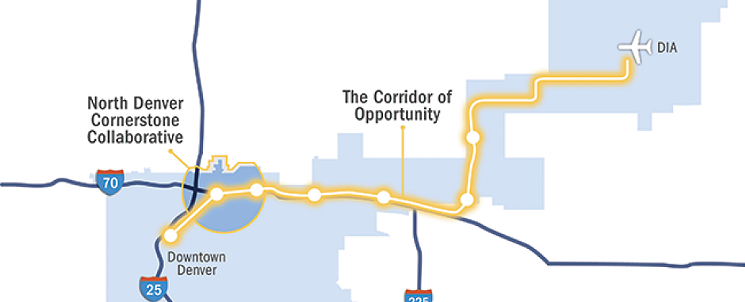Hancock and his supporters have consistently touted the projects as focal points of economic growth and job creation, but they have also been criticized by members of these communities, as well as others around town. A lawsuit filed in 2016 claimed that the infamous Platte to Park Hill stormwater project was clandestinely linked to the I-70 expansion, and another suit filed July 10 argues that the government bypassed obligations to consider the environmental impacts of what's now known as the Central 70 project.
Today, July 18, even more controversy was added to the mix when the Globeville, Elyria-Swansea Coalition Organizing for Health and Housing Justice (GES Coalition) released a comprehensive survey titled "The People's Survey: A Story of Displacement." The report found that residents of GES, already a highly vulnerable minority population, are in the early stages of mass displacement as a result of the influx of development in their neighborhoods.
The GES Coalition was formed by a group of residents and community organizations including Focus Points, Project Voyce, Colorado Community Land Trusts and The GrowHaus, and the survey was produced in collaboration with FRESC, a local nonprofit. From May through August 2016, coalition members and volunteers conducted a door-to-door survey of 1,500 homes in the GES area and collected 500 completed surveys.
The survey found that a great majority of GES residents (80 percent) want to stay there. Over 50 percent of the people living in GES have been residents for between seven and ten years, the survey determined, and 70 percent of residents over the age of 55 have lived in GES for more than ten years.

The Corridor of Opportunity and the North Denver Cornerstone Collaborative, which includes the development projects in GES.
Denvergov.org
In early July, the city and the Colorado Department of Transportation celebrated the opening of a new career training and resource center linked to the Central 70 expansion, which mandates hiring at least 20 percent of the project's workforce from neighborhoods along the interstate affected by the construction.
But members of the GES Coalition don't have much faith in the city's promise of opportunity and growth. They say that rather than benefiting their underserved communities, the projects are exclusionary, and that the developers have only considered the ramifications of displacement as a secondary issue.
"We are trying to break the narrative of the city government," explains Robin Reitchhardt, a community organizer for the GES Coalition and a staff member at Focus Points. To that end, one of the goals of the study is to show that "gentrification and displacement are political violence," he says, adding that the current changes in GES are just par for the course in a history of state-sponsored injustice including redlining, urban renewal and zoning to allow hundreds of marijuana cultivators to locate in the area.
Reitchhardt and other coalition members hope that the survey underscores the link between health and housing; according to the survey, stability and affordable living are "primary determinant[s] of health." If the city hopes to mitigate the effects of displacement, coalition members argue, there needs to be targeted intervention as soon as possible. Some of their recommendations include creating more targeted hiring programs and passing a housing bond to ensure affordability in the neighborhoods.
Additionally, at the meeting where the survey was released, the coalition announced a partnership with the Colorado Community Land Trust to develop a resident-driven community land trust to help protect residents from the drastic market changes.
In the past, Denver City Councilman Albus Brooks, whose District 9 includes GES, has stressed that "residents are feeling disconnected from what is happening." At the ribbon-cutting ceremony for the CDOT career center, he noted that the program was an incredibly important step, but that the city would need to "stay committed" to helping the communities disproportionately affected by the development projects.
A copy of the survey is available electronically on the GES Coalition website.












